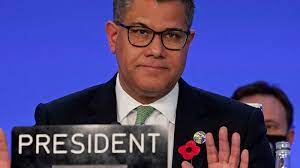Alok Sharma, the man entrusted to accelerate global efforts to reduce greenhouse gas emissions, has warned Australia must be prepared to lift its own ambitions if it wants to host a United Nations climate summit in two years’ time.
The British cabinet minister, who won plaudits for his chairing of the fractious COP26 summit in Glasgow in November, said while Australia’s “return to the frontline” on climate change was a “good start”, it must continue to review its 2030 target along with other leading economies if the world is to keep the aim of limiting global temperature rises to 1.5 degrees alive.
Speaking to The Sydney Morning Herald and The Age ahead of his first trip to Australia as COP26 president, Sharma said the Albanese government’s increased ambition to reduce emissions by 43 percent on 2005 levels was important, but would not be enough on its own.
Labor announced, ahead of its election win, that it would bid to host the international summit in partnership with Pacific nations as part of its efforts to improve Australia’s climate credentials within the region.
“When you host a COP and ask other countries to show more ambition, the first thing they will ask you, very politely, is what you are doing yourself in terms of cutting emissions and in terms of investing in green energy sources,” Sharma said.
“Any country that ends up with a COP should also realise they will end up in the spotlight in terms of what they are doing domestically, as they seek to encourage others to show more ambition.”
The annual Conference of the Parties – known as COP – has brought nations together for deliberations for almost three decades, taking climate from a fringe issue to a global priority. It produced the Kyoto Protocol in 1995 and the Paris Accord in 2015. Based on lat year’s event in Glasgow, a conference held in Australia could cost taxpayers at least $500 million (US$346 million) in security services alone.
Sharma arrives in Australia ahead of renewed domestic debate about whether Labor’s new target – which increased from the previous government’s 26 to 28 percent to 43 percent – is a large enough contribution to efforts to limit global temperature increases.
Federal parliament’s massively expanded cross bench of Greens and climate-focussed independent MPs partly funded by renewable energy promoters is set to clash with Labor over the target when new legislation is introduced next week. Their preferred targets range from 60 to 75 percent reductions in greenhouse gas emissions by 2030.
Minister for Climate Change and Energy Chris Bowen has signalled he is open to a “ratchet mechanism” that would allow the target to be raised in future, while several Labor frontbenchers have privately expressed views that the election result has given the party cover to lift its ambitions.
Sharma will also meet privately with the so-called Teal independents during his trip to Canberra, to discuss global efforts to combat climate change.
He said both the science and recent real-life examples of fire and floods in Australia and 40 degrees days in London showed that the chronic threat of climate change was getting worse.
“I very much encourage every country, including Australia, to show more ambition,” Sharma said. “It’s a very good start, I think the commitment the prime minister [Anthony Albanese] has made is great, but of course now it is also about delivery.”
Britain, which has pledged to slash emissions by 78 percent by 2035 compared to 1990 levels, retains the presidency of the summit until Egypt takes over at COP27 in Sharm el-Sheikh in November. Until then, Sharma has vowed to hammer out the green deals and rally the support needed for nations to fulfil their Glasgow promises.
The Conservative MP said he expected to discuss Australia’s COP29 bid in 2024 when he meets personally with Bowen this week, as well how Australia’s plans to achieve its aims, which he said would need commitments on coal, cars, trees and methane and an acceleration of the shift to renewables and clean technologies.
He said the world also needed developed countries, such as Australia, and other climate finance providers to ensure that funds flow to national and local priorities, supporting the ambitions of developing nations.
Sharma said as a major world economy and member of the G20 that leadership from Australia on climate would influence other nations as well as secure an economic dividend in a transition to a green economy.
“The G20 is responsible for 80 percent of global emissions, so I think that all the G20 countries really do matter,” he said.
SOURCE: SMH/THE AGE/PACNEWS














